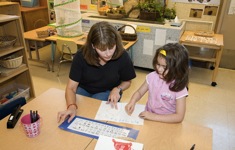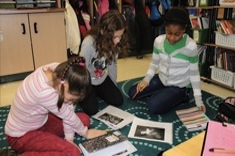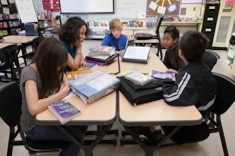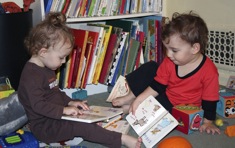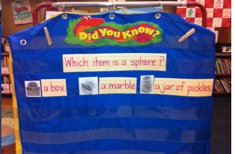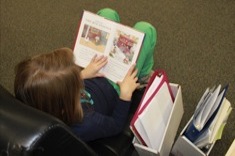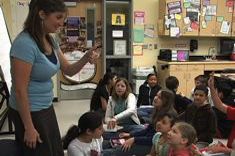Articles
Here is where you’ll find all the latest print features from our contributors. If you’d like to browse specifically by grade level, topic, or contributor, you can use the links in the right sidebar.
Latest Content
Three Ways to Build Purpose in a Preschool Reading Workshop
Melissa Kolb finds her three- and four-year-old students are ready for more focus during reading time.
Shared Reading in the Intermediate Grades
Shari Frost explains why shared reading is valuable for older students, with examples of the practice in the intermediate grades.
Symbiosis: Choice and Structure in Writing Workshops
Ruth Ayres and Heather Rader draw on their work as literacy coaches and teachers to explore the complex connections between choice and structure in writing workshops.
Between the Brain and Page: Working with Gifted Student Writers
Michelle Kelly explains how gifted student writers have needs that vary greatly. "Carolyn the Voice," "Alan the Verbose," and "Bailey the Perfectionist" are all gifted writers who need different workshop structures and guidance to do their best work.
Assessing Learning During Student-Led Book Clubs
When middle school students have choice and independence in book clubs they lead themselves, how do you assess their learning and thinking? Katie Doherty provides a variety of question prompts she uses with groups to spark reflection on learning.
10 Principles for Planning Reading Minilessons
Franki Sibberson shares 10 principles for minilesson planning. This is an excerpt from her new book, The Joy of Planning.
Understanding the Middle East Through Children’s Literature (BOOKLIST)
Sheiks, harems, and terrorists — the stereotypes of the middle east from popular culture may not be realistic, but they sure are pervasive. Ruth Shagoury and Andie Cunningham find authentic alternative views to present to children in their new booklist.
Research IS the Project (Primary Research Series)
Heather Rader blurs the line between research and presentation in the final installment of the primary research series.
Embracing the Growth Mindset with Audiobooks
Jennifer Vincent explains how recorded texts were a potent tool for reaching a struggling fourth-grade reader.
Audioboo, QR Codes, and Authentic Reading Response
Katherine Sokolowski uses audio recordings and other tech resources to build her fifth-grade reading community.
Tips for Effective Family Communication from “The Mouse”
Jennifer Vincent details strategies and shares survey templates she uses in reaching out to families.
KLWL: Ordering Research (Primary Research Series Part 3)
Heather Rader looks at the importance of frontloading information for young learners in the third installment of the primary research series.
Family Literacy Night
Family Literacy Nights have become popular in many schools. Principal Jennifer Schwanke describes the format for a successful event, including a sample program and tips.
A Literary Taste of Home (Home is Where the Books Are Series)
Meghan Rose may live in Los Angeles, but the home of her heart will always be New England. In this booklist, she shares her favorite picture books about everything from the Red Sox to Maine blueberries to give her children a sense of where she grew up.
Hindsight: What I Wish I’d Known Before My School Burned Down
Melanie Quinn shares lessons from the fire that burned down her school.
Just-Right Poetry and Individualizing Instruction
Shari Frost describes how a sixth-grade teacher provides a range of poetry options to meet the needs of all students.
The “Tys” of Student Research: Safety and Credibility (Primary Research Series Part 2)
Heather Rader shares the second installment in our primary research series.
March Book Madness
Basketball’s March Madness has many possibilities in schools. Tony Keefer tries a similar format with brackets and voting for March Book Madness.
Beyond Text Features in Nonfiction Instruction
Franki Sibberson considers how the demands of the Common Core and the complex mix of online and offline nonfiction texts are changing the skills she teaches students.
Putting the Search Back in Research
Heather Rader launches a new four-part series on teaching research skills in the primary grades. This first installment highlights search techniques for children.
Supporting the Transition to Middle School: An Elementary Teacher’s Perspective
Maria Caplin shares how and why she began to collaborate with Gretchen Taylor, a sixth-grade teacher who would soon be the middle school teacher for some of her students.
What Information Is Good Information? Smooth and Effective Transitions to Middle School
Gretchen Taylor explains her role in observing Maria’s fifth-grade classroom, and then building a relationship with students and their families.
Poetry Minute: Forms and How to Teach Them
Mary Lee Hahn's "Poetry Minute" includes tips and resources for poetry instruction. This month's Poetry Minute focuses on poetry forms and mentor texts to teach them.
Getting Rid of My Teacher’s Desk
Katherine Sokolowski discovers getting rid of her teacher's desk opens her mind to many new possibilities in her fifth-grade classroom.
Transitions Are Like Underwear
If you tell students transitions are like underwear, they sit up and pay attention. Heather Rader uses the analogy to help students analyze and improve the transitions in their writing.
Kindergarten Moments Count: Question of the Day
Keri Archer makes the most of the time her kindergarten students spend transitioning into her classroom with her Question of the Day.
Building a Reading Community with Edmodo
Katherine Sokolowski discovers Edmodo is a wonderful tech tool for helping her fifth graders become more independent and supportive of everyone’s reading choices.
Supporting Introverts in a First-Grade Classroom
Courtney Pawol looks at how being an introvert affects her role in learning communities, and then moves from insight to practical changes to help the introverts in her first-grade classroom.
The Truth About Building a Writing Community in Middle School
Building a sense of community is complicated in middle school classrooms. Katie Baydo-Reed considers her eighth graders, and is surprised at what endures most with these young teens.
Make a Note
Why is Leslie Woodhouse so forgetful? It’s all part of a not-so-devious plot to teach her preschool students the power of creating and leaving notes throughout the classroom.
Browse Content By
Type
Category
- Assessment Tools
- Big Fresh Archives
- Booklists
- Choice Numeracy
- Classroom Design
- Common Core
- Community Building
- Conferring
- Content Literacy
- Digital Literacy
- English Language Learners
- Equity
- Family Relations
- Free Samples
- Guiding Groups
- Leadership
- Literacy Coaches
- Mentor Texts
- Minilessons
- New Teacher Mentors
- Podcasts
- Poetry
- Quote Collections
- Reading Strategies
- Self Care
- Struggling and Striving Learners
- Talking and Listening
- Teacher Study Groups
- Teaching Reading
- Teaching Writing
- Word Study and Vocabulary
Author
- Melissa Quimby
- Nawal Qarooni
- Gwen Blumberg
- Julie Cox
- The Lead Learners
- Hannah Tills
- Josie Stewart
- Ruth Metcalfe
- Mallory Messenger
- Becca Burk
- Jodie Bailey
- Vivian Chen
- Mary Brower
- Tiffany Abbott Fuller
- Stephanie Affinito
- Ruth Ayres
- Leigh Anne Eck
- Heather Fisher
- Shari Frost
- Julie Johnson
- Suzy Kaback
- Gigi McAllister
- Shirl McPhillips
- Melanie Meehan
- Cathy Mere
- Debbie Miller
- Tara Barnett and Kate Mills
- Tammy Mulligan
- Dana Murphy
- Bitsy Parks
- David Pittman
- Brenda Power
- Heather Rader
- Matt Renwick
- Mandy Robek
- Christy Rush-Levine
- Gretchen Schroeder
- Jen Schwanke
- Brian Sepe
- Katherine Sokolowski
- Stella Villalba
- Jennifer Vincent
Grade Level
Choice Literacy Membership
Articles
Get full access to all Choice Literacy article content
Videos
Get full access to all Choice Literacy video content
Courses
Access Choice Literacy course curriculum and training

